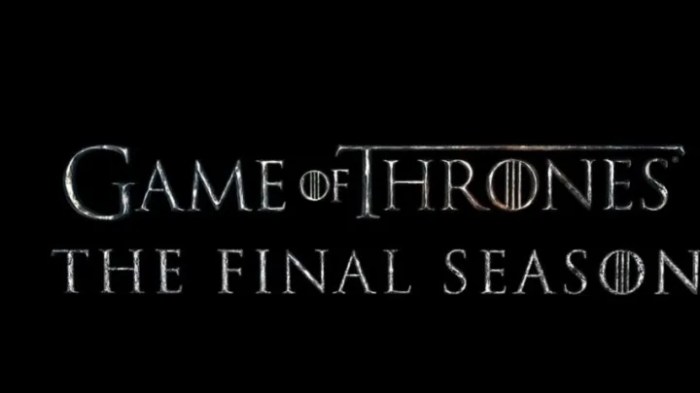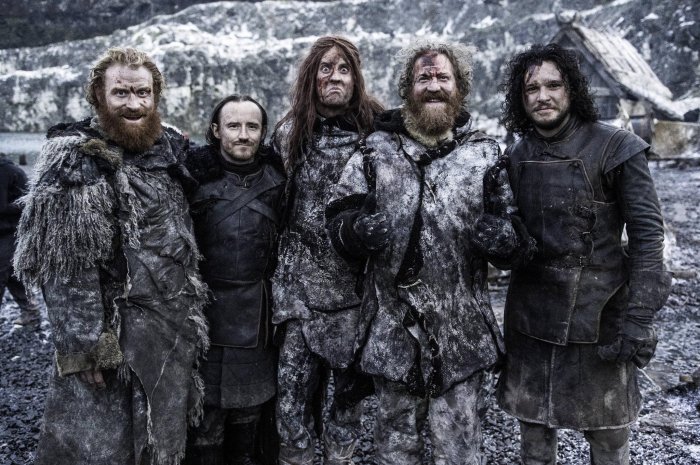The Impact of Fan Expectations
Game of Thrones, with its intricate world-building, complex characters, and shocking twists, captivated audiences worldwide, creating a fervent fanbase eager to see how the story would unfold. However, this passionate fandom also fueled a set of expectations that ultimately played a significant role in the reception of the show’s final seasons.
The Seeds of Expectation
The show’s early seasons laid the groundwork for a specific type of ending that many fans anticipated. The meticulous development of intricate plotlines, the morally gray characters, and the ever-present threat of death created a sense of anticipation for a satisfyingly complex and unpredictable conclusion. The following key moments contributed to this expectation:
- The Red Wedding: This shocking and brutal event cemented the show’s willingness to kill off beloved characters, raising the stakes and making viewers question who would survive. It also fueled theories about the show’s unpredictable nature.
- The Battle of the Bastards: This epic battle showcased the show’s ability to deliver large-scale action sequences while still maintaining emotional weight. It heightened expectations for a climactic final battle against the Night King and his army of the dead.
- The Rise of Daenerys Targaryen: Daenerys’s journey from a vulnerable young woman to a powerful and ruthless queen captivated audiences. Her arc fueled anticipation for her eventual claim to the Iron Throne, and the potential for a thrilling final confrontation with Cersei Lannister.
The Discrepancies and Backlash
While the show’s early seasons nurtured expectations for a complex and satisfying conclusion, the final seasons, particularly the last two, deviated significantly from what many fans anticipated. This divergence led to a significant backlash, with viewers expressing their disappointment and frustration.
- The Rushed Pacing: The show’s final seasons felt rushed, with plotlines and character arcs being resolved too quickly, leaving many viewers feeling dissatisfied. The rapid development of storylines like Jon Snow’s parentage and Daenerys’s descent into madness left many fans feeling like the characters’ actions were not fully justified.
- The Anticlimactic Ending: The final battle against the Night King, while visually impressive, felt underwhelming and anticlimactic to many viewers. The threat of the White Walkers, which had been built up for several seasons, was defeated with relative ease, leaving many fans feeling cheated of a more epic and satisfying conclusion to the show’s main conflict.
- The Unfulfilled Character Arcs: Several key characters, such as Tyrion Lannister and Sansa Stark, seemed to have their arcs abruptly cut short, leaving many fans feeling disappointed that their potential was not fully realized.
The Influence of Fan Theories
The prevalence of fan theories and online discourse had a significant impact on the show’s narrative trajectory. While some theories were debunked, others were incorporated into the show’s narrative, often to the disappointment of fans who had invested in them.
- The “R+L=J” Theory: This theory, which posited that Jon Snow was the son of Rhaegar Targaryen and Lyanna Stark, was widely discussed online and eventually confirmed by the show. However, the way the theory was revealed and its implications for Jon’s character arc were not received well by many fans.
- The “Azor Ahai” Theory: This theory, which suggested that Jon Snow was the prophesied hero destined to defeat the Night King, was widely discussed and expected by many fans. However, the show’s final season did not fully realize this theory, leading to disappointment among many fans.
The Role of Source Material
The success of Game of Thrones can be attributed, in part, to its foundation in George R.R. Martin’s A Song of Ice and Fire novels. However, the show’s adaptation took significant liberties, diverging from the source material in ways that both enhanced and complicated the narrative.
The show’s adaptation of Martin’s books was a complex undertaking, navigating the delicate balance between fidelity to the source material and the demands of television storytelling. While the show initially followed the books closely, it eventually diverged significantly, creating its own unique path.
Deviations and Their Impact on the Narrative
The show’s deviations from the books had a profound impact on the narrative. Some of the most notable changes include:
- Character Development: The show often accelerated character arcs, leading to some characters feeling underdeveloped compared to their book counterparts. For instance, Daenerys Targaryen’s transition to a ruthless ruler in the show was more abrupt than in the books, where her descent into tyranny is a more gradual process.
- Plotlines and Subplots: The show streamlined certain plotlines and eliminated others entirely, leading to a more focused and streamlined narrative. For example, the show removed the Greyjoy subplot involving Asha Greyjoy and her brother, Theon.
- Ending: The show’s ending, particularly Daenerys Targaryen’s fate, deviated significantly from the books. This divergence sparked heated debates among fans, with some arguing that the show’s ending was a betrayal of the source material while others appreciated its originality.
Accelerated Pacing and Creative Liberties
The show’s accelerated pacing and creative liberties had a mixed impact on the overall story and character development.
- Character Development: The show’s rapid pace sometimes led to characters feeling underdeveloped, especially those introduced later in the series. The show’s creators had to condense years of character development from the books into a shorter timeframe, leading to some characters feeling rushed or incomplete.
- Plot Complexity: The show’s streamlining of certain plotlines and subplots, while simplifying the narrative, also resulted in a loss of complexity. Some fans felt that the show’s condensed version lacked the depth and nuance of the books.
- Impact on the Story: The show’s creative liberties allowed for a more visually spectacular and dramatic narrative, but also introduced elements not present in the books. This resulted in a more action-oriented and less character-driven story, which some fans found jarring.
The Influence of the Books’ Unfinished State
The show’s ending was heavily influenced by the unfinished state of the books.
- Speculation and Theories: The show’s creators had to speculate and theorize about Martin’s intended ending, as the books were incomplete. This led to a degree of uncertainty about the show’s trajectory, which some fans found frustrating.
- Creative Freedom: The unfinished state of the books gave the show’s creators a degree of creative freedom, allowing them to deviate from the source material and create their own ending. However, this freedom also came with the risk of alienating fans who had invested in the books.
The Legacy of Game of Thrones: Game Of Thrones End Sooner Than We Think
Game of Thrones, the epic fantasy television series that captivated audiences worldwide, has left an undeniable mark on popular culture. Its influence extends far beyond the realm of television, impacting fashion, language, and even the way we think about storytelling. The show’s controversial ending, however, has also sparked debate and raised questions about the long-term implications for the franchise and the television industry as a whole.
Cultural Impact, Game of thrones end sooner than we think
Game of Thrones’ cultural impact is undeniable. The show’s popularity has led to a surge in interest in fantasy literature and television, inspiring a new generation of creators and fans. The show’s influence can be seen in everything from fashion to language.
- Fashion: The show’s intricate costumes and intricate designs have inspired fashion trends worldwide. From the fur-lined cloaks of the Starks to the elaborate gowns of the Lannisters, Game of Thrones has become a source of inspiration for designers and fashion enthusiasts alike.
- Language: The show’s unique dialogue, featuring a blend of archaic English and invented words, has entered the lexicon of everyday speech. Phrases like “Winter is coming” and “Valar morghulis” have become popular catchphrases, even among those who have never seen the show.
- Tourism: The show’s popularity has also boosted tourism to locations used in the series, such as Iceland and Croatia. Fans flock to these destinations to see the real-world locations where their favorite scenes were filmed.
The Impact of the Controversial Ending
The show’s final season was met with mixed reactions, with many fans expressing disappointment with the pacing, character development, and overall narrative. The controversial ending sparked widespread debate, with some arguing that it was a betrayal of the show’s legacy, while others defended it as a bold and unpredictable conclusion.
The show’s controversial ending has had a significant impact on the franchise. While the show’s popularity remains high, the negative reactions to the ending have led to a decline in viewership for the spin-off series, “House of the Dragon.” The ending has also fueled speculation about the future of the franchise, with some questioning whether HBO will be able to recapture the magic of the original series.
The controversy surrounding the ending has also had implications for the television industry as a whole. It has highlighted the importance of satisfying fan expectations and the potential risks of deviating from source material. The backlash against the ending has led some creators to be more cautious in their storytelling, fearing similar negative reactions from fans.
Future Adaptations and Expansions
Despite the controversy surrounding the ending, the Game of Thrones universe continues to expand. HBO is currently developing several spin-off series, including “House of the Dragon,” which focuses on the history of the Targaryen dynasty. The success of these spin-offs will depend on their ability to capture the spirit of the original series while offering new and compelling stories.
The potential for future adaptations and expansions of the Game of Thrones universe is vast. The novels by George R.R. Martin provide a wealth of source material, and the world of Westeros is ripe for exploration. The success of these future projects will depend on the ability of creators to capture the magic of the original series while avoiding the pitfalls of the controversial ending.
Game of thrones end sooner than we think – Despite its controversial ending, Game of Thrones remains a cultural touchstone, forever changing the landscape of television. Its legacy, however, is a complex one. While the show’s influence on popular culture is undeniable, the lasting impact of its rushed and unsatisfying conclusion is still being debated. The show’s creators, faced with the impossible task of adapting a sprawling and complex novel series, made choices that ultimately alienated a large portion of the fanbase. This, combined with the pressure of delivering a satisfying conclusion to a show that had become a cultural phenomenon, resulted in an ending that was both divisive and disappointing.
Remember how we all thought *Game of Thrones* would drag on forever? Well, it seems even the most epic sagas have their limits. And, speaking of limits, GameStop’s new unlimited game rental service, which was supposed to be a game-changer , has been put on hold. Maybe they’re just waiting for the right time to unleash it, just like the Night King waited for the perfect moment to unleash his army of the dead.
Either way, we’re all waiting with bated breath, hoping it won’t be another “Winter is Coming” that never really arrives.
 Standi Techno News
Standi Techno News

